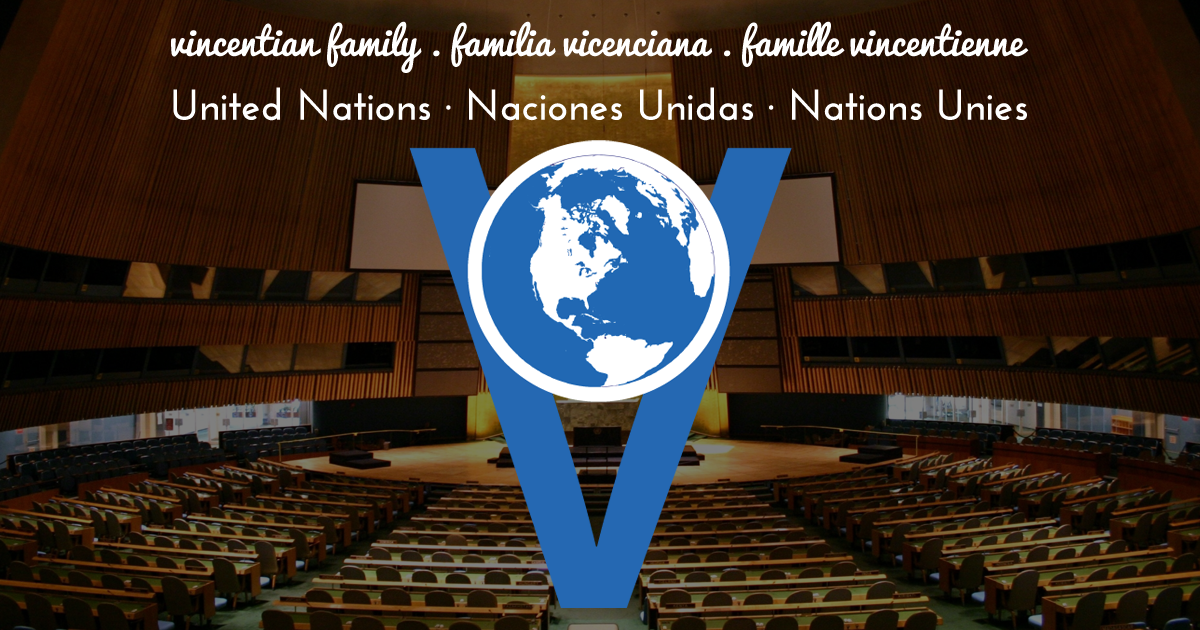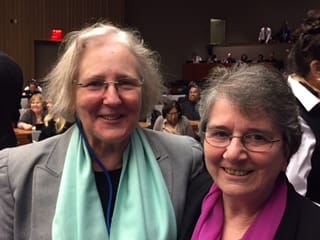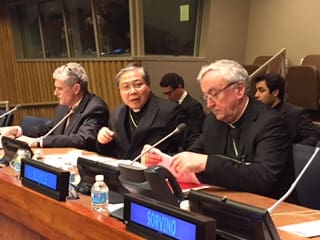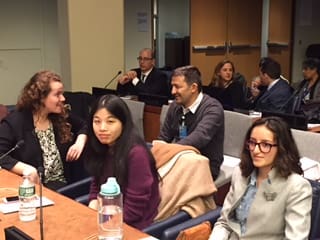
“Here in 2016 we talk a good game on anti-trafficking and slavery. Now is the time for action,”
The Holy See delivered some powerful messages about ending human trafficking and slavery, April 7, says Sr. Margaret O’Dwyer, DC, during a multi-panel discussion at the United Nations. The conference was entitled “Ending Human Trafficking by 2030: The Role of Global Partnerships in Eradicating Modern Slavery,” and moderated by Archbishop Bernardito Auza. The Permanent Holy See Mission to the United Nations and the Santa Marta Group co-sponsored the event.
Particularly strong voices emanated from panelists Macharia Kamau, Kenya’s Ambassador to the UN; Kevin Highland, the UK’s first independent anti-slavery commissioner; actress Mira Sorvino; Mogens Lykketoft, President of the 70th Session of the UN General Assembly last Fall; and Cardinal Vincent Nichols, Archbishop of Westminster and President of the Catholic Bishops’ Conference of England and Wales. Donna Hubbard, a current flight attendant and pastor who had survived both human trafficking and slavery, said firmly, “We can no longer ignore this,” she said. “It is not just something happening in some other country.”
The panel opened with a Papal appeal which would ring true to every Vincentian ear: “I encourage you to strengthen the bonds of cooperation and communication which are essential to ending the suffering of the many men, women, and children who today are enslaved and sold as if they were a mere commodity,” wrote Pope Francis to the assembled group. “In this way, solutions and preventative measures can be promoted which will allow this evil to be addressed at every level of society.” Said the Pope, “In your discussions, I hope also that you will keep before you the dignity of every person, and recognize in all your endeavours, a true service to the poorest and most marginalized of society, who too often are forgotten and have no voice.”
Lykketoft, who followed the reading of the Pope’s message, mentioned that Pope Francis had set the tone for the UN General Assembly last Fall. During that Assembly, member states approved the Sustainable Development Goals (SDGs), which include Target 8.7, calling for the eradication of modern slavery by 2030.
“When we were working on the Sustainable Development Goals, you would not believe how difficult it was to get this key issue on board,” reflected Ambassador Kamau. He said it took the direct intervention of Pope Francis to get that component included.
Lykketoft referred to human slavery as one of the most exploitative practices. He noted that between 2010 and 2012, victims of human trafficking were of 152 citizenships and 124 countries, but likely more. He said human trafficking is prevalent from fishing boats, to brothels, to the homes of the wealthy, where maids sleep on the floor and are not allowed outside.
“Fight for, press for, argue for, provide for more resources for the fight against human trafficking,” Lykketoft pleaded.
According to Commissioner Highland, human trafficking generates 150 billion illegal dollars in profit. The world spends a fraction on combating it, he noted with chagrin.
“This meeting cannot be a business as usual approach,” said Highland. “The sad and simple truth is that the anti-slavery movement has so far failed. Modern slavery continues to boom as an industry.”
In addition to the rape, abuse, and violence which the victims experience, there are many additional costs, Highland noted. Victims often must pay off enormous debts to traffickers. Because families are left behind, some elderly have no one to care for them. Many trafficked persons are young, which means that communities lose the contributions of youth.
Highland offered a number of means of fighting human trafficking. He called for mainstreaming efforts into wider development, human rights, criminal justice, and national security programs. Next, he noted that there are many silos of resources but little strategic coordination. There needs to be more shared data, communication, and coordinated sharing and focus of resources.
“Here in 2016 we talk a good game on anti-trafficking and slavery. Now is the time for action,” said Highland.
The audience was gripped by Kamaus’ observation that modern slavery will not end if the global community fails to make progress on climate change, development and unemployment, as well as by confronting the issues of racism and misogyny. Slavery, he said, is a global institution deeply rooted in human history and the human heart.
“This issue goes beyond (addressing slavery) to how we human beings treat each other, embrace each other and ultimately give each other the space to live on this earth as human beings,” said Kamau.
Kamau said that “8.7 is just a target and all the legislation and all the good will in the world will not mean anything if we don’t have a change of heart in the way we human beings treat each other.” If global leaders do not take responsibility for fundamental structural changes to respond to climate change and vast social disparities which dislodge and immiserate the world’s poor, he said, “it is inconceivable that people will not be carted off into modern slavery.”
Cardinal Nichols said human trafficking and modern slavery strip people of their fundamental dignity. “It is therefore and evil crying out to heaven,” he said. “That there are more than 20 million people callously held in slavery in our world is a mark of deep shame on the face of our human family that no words can remove.”
The Cardinal noted three key encounters which helped him recognize the importance of human trafficking issues. One was the work of religious women with Scotland Yard. At first, the sisters thought police would prosecute the women they were trying to protect. But trust built between the two groups over time has led to changes of mindset and procedures. “This partnership transformed their ability to rescue victims, care for them, and pursue persecutors of this crime,” he said.
He also mentioned Pope Francis had encouraged him to “keep this work (against human trafficking and modern day slavery) going.” The Cardinal said, “He is direct and blunt about what he expects from us; something far more than words. He expects effective action on the ground which frees prisoners in a world where there is so much suffering and grief.”
Cardinal Nichols noted the partnership between Santa Marta and the Catholic Church. It engages with 34 countries to form alliances of action against human trafficking. Among them are a program in Nigeria; the North Atlantic Maritime Program, which looks at unjust working conditions in the fishing industry; and initiatives in Lithuania and Argentina. Requests are coming in from other nations. (The Santa Marta Group is an alliance of international police chiefs and bishops from around the world working together with civil society in a process endorsed by Pope Francis, to eradicate human trafficking and modern day slavery).
The SDGs, said Cardinal Nichols, require every member state to work on the eradication of slavery. “That can’t happen without international cooperation at every level, with clear objectives and shared motivation.”
“It is the victim who must always be central to our efforts,” said Nichols. He said the world must enhance the work of law enforcement, break up criminal networks, arrest perpetrators, and strengthen the legal frameworks with which these efforts are carried out.
Award winning Actress Mira Sorvino posed the question, “How is it that our response is not more robust that we allow slavery to grow in the world when every country has outlawed it?”
Beating back human slavery until it disappears should be one of the moral imperatives of the UN, she said. “And yet even in the active states, not nearly enough is being done.”
She quoted a European trafficker who told her that criminals have crossed over from drugs to humans because the punishment is less. “We’ve got to fight this ‘Hydra,’” she said.
She called for President Obama to devote more money to fighting human trafficking, for the British to give more teeth to their modern slavery act, for individuals to stop looking for cheap products, and for all to halt the demand for modern slavery.
Sr. Imelda Poole, President of RENATE (Religious in Europe against Trafficking and Exploitation) urged that the world examine and diminish the demand for trafficked persons and modern day slaves, such as the demand for the sex industry and for cheap labor, when looking at ways to combat the crime. She further called for checking whether laws are clear. For example, she inquired, “Are victims released or made criminals?” She also appealed for an end to corruption, which plays a tremendous role in human trafficking. She invited information technology experts to start addressing internet trafficking and criminal behavior on the net.
(Click on the images for captions)
- Imelda Poole, IBVM, President of RENATE (Left)
- Archbishop Bernardito Auza, Permanent Observer of the Mission of the Holy See to the UN, flanked on hisleft by Mogens Lykettoft, 70th President of the UN General Assembly; and on the right by Cardinal Vincent Nichols, Archbishop of Westminster.
- Guillermo (Memo) Campuzano, C.M. accompanied by St. John’s University Students








0 Comments